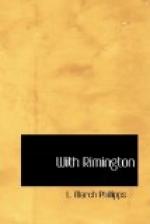disappeared. It is like a conjuring trick.
He seems to have an intuitive knowledge of the plans
of our generals, and to divine how any movements of
his will modify theirs. He makes a swift march.
This he knows will set in motion a certain column.
Night comes and back he steals, and dashes out through
the gap left without any one being the wiser.
He never loses his sangfroid, but acts always, in
the most hopeless positions, with equal craft and
rapidity. In short, like the prophet Isaiah, he
is “
capable de tout.” For
he can hit hard, too. I think since the arrival
of the main army he is the only man who has scored
off us at all freely. Sanna’s Post and
Reddersberg came first; then, last May, came the capture
of the 500 Yeomanry at Lindley; that was followed immediately
by the surprise of the Heilbron convoy and all its
escort; then came the capture of the Derbyshire Militia,
and a few days later the taking of Roodeval with a
train of mails and various details. Even when
he had bolted out the other day between our legs,
and was flying north with two or three cavalry brigades
after him, he found time to snap up a hundred Welsh
Fusiliers and break the line as he passed. He
is, they say, extremely amusing, and keeps his men
always in a good temper with his jests; the other
day, after one of his many train captures, he sent
a message to the base to say that “he was sufficiently
supplied with stores now, and would they kindly send
up some remounts.” He is now the only prize
left worth taking, and every one is desperately keen
in his pursuit. I notice, however, that people
never seem to meet him when they want to, though when
they don’t want to, they very often do.
Olivier, with a force about equal to De Wet, also
broke out from the hills, and having reached the open
country, hung about to watch our movements. There
are some kopjes ten miles south of Heilbron, very
nicely arranged, with a back hill commanding a front
one, so that the first position gained would only
bring us under the fire of the second; a very favourite
Boer trick. Here Olivier awaited our coming, and,
knowing the range to an inch, landed his first shell
plump in the middle of our convoy. Hunter, and
we with him (it is certainly great fun being with
the Staff for the time being), were at the head of
the column, and heard the shell go over. Never
have I seen a better shot. It exploded on the
track, right underneath a great waggon, to the amazement
and consternation of the Kaffir drivers and the wretched
oxen; though they were all, I believe, a good deal
more frightened than hurt. Three or four more
quickly followed. “Roll that up,”
said Le Gallais to the Guide carrying the General’s
flag. A few minutes passed, during which we were
shot at without being able to reply. Then two
Field Batteries came galloping to the front.
Guns! Guns! Way for the guns! like the fire-engines
down Piccadilly they came tearing along. As the
iron wheels strike upon rocks the guns leap and swing.
Stones and splinters fly right and left, and the dust
flung up by wheel and hoof boils along their course.
Nothing is more stirring than to see guns coming full
speed into action. In another minute they have
lined up on the ridge and their shells are bursting
on the enemy’s hill.




